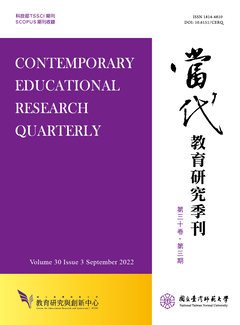

研究目的
近年來證據本位的研究結合績效責任的管理,已經成為提升教育專業的主流意見。隨著PISA 的國際評比,也更形成各國教育決策的重要參考。本研究即針對此一議題加以探究,並提出對臺灣教育的反思之道。
研究設計/方法/取徑
本文運用哲學研究方法,研究者檢視西方學者G. J. J. Biesta 對於證據本位教育、績效責任以及PISA 等提出的哲學反思,研究者以Biesta 的專書與論文為主,旁及其他學者的討論為文本分析的內容。
研究發現或結論
Biesta 認為證據本位教育在知識論上是建立在線性、因果的模式,本體論上是適用於封閉體系,在實際應用上無法滿足教育的需求。Biesta 提出價值本位以取代證據本位教育的偏失。績效責任源自於企業界的審計制度,主要的問題是將責任概念狹隘化。由於沒有深思教育目的,績效責任淪為管理主義,過度強調消費者本位,甚至可能破壞民主的價值。PISA 所測出的學習成果,更形成國際間競爭的社會心理現象,失去原意。Biesta 提出「教學即異議」的隱喻,說明教育過程的不確定性,不能受限於以線性時間觀念的學習產出的思維,教育人員要超越只重視能力表現的追逐,回復學生主體自由。
研究原創性/價值
臺灣教育政策的制定,大體上都是根據國際趨勢或國內實際需求。近年來學者們也大力疾呼證據本位教育、績效責任,也很重視PISA 的評比。 Biesta 認為這種重視學習成果表現的邏輯,會弱化吾人探索教育的本質。他認為教育目的應涵蓋三個層面的思考:資格化、社會化與主體化。量化的學習成果只能呈現資格化與社會化的部分成就,而欠缺主體化的省思。Biesta 很全面的反思證據本位教育、績效責任與PISA,不僅可以提供臺灣對當下教育政策的反思,也可以提升教育研究方法論。鑑於臺灣教育政策論述,很少有嚴格哲學論證,本研究將能為臺灣學界探索教育政策時,提供國外教育哲學的優質論證範例。
教育政策建議或實務意涵
經由本文檢視Biesta 對證據本位教育、績效責任與PISA 的反思,將有助於吾人理解臺灣近年過於重視學習產出、關鍵指標等的缺失,從而擬定更符合學生主體性的教育政策。
Purpose
In recent years, the evidence-based research, combined with managerialism of accountability, has become the mainstream idea in the enhancement of education. With its worldwide study, PISA also makes an important suggestion for the education policy-makers amongst the countries. Hence, this study aims to explore this issue in an attempt to propose a reflection on Taiwan’s education.
Design/methodology/approach
Drawing on the method of philosophical study, the researcher investigates G. J. J. Biesta’s philosophical reflections on evidence-based education, accountability, and PISA. Paying a particular attention to Biesta’s monographs and essays, the researcher addresses the critical articles reviewed by other scholars on him as the content analysis.
Findings/results
Biesta believes that evidence-based education is based on the linear and causal model in epistemology. Ontologically, it is applicable to a closed system; however, it is not to the practical needs of education. Biesta proposes value-based education as an alternative for evidence-based education. Accountability is derived from the audit system for businesses, in which its primary problem is to reduce the concept of responsibility in a narrow sense. Without the thinking of educational aim, accountability can be reduced to managerialism with an excessive emphasis on the consumers of education. This, however, may damage the values of democracy. The learning outcomes measured by PISA have lost their original intent by creating a social psychological phenomenon of international competition. Biesta’s metaphor of “teaching as dissensus” illustrates that the uncertainty of the educational process cannot be restricted merely to the logic of learning output based on a linear temporal model. Instead, he urges educators to reclaim, rediscover and restore the subjective freedom of students beyond the linear model that focuses only on learning performativity.
Originality/value
Taiwan’s education policy is generally formulated in accordance with the international trend or its actual domestic needs. While scholars recently call for evidence-based education, accountability, as well as PISA, G. J. J. Biesta assert that this logic of education focusing on the performativity of learning outcomes will weaken our original intention of exploring the nature of education. He contends that the aim of education should encompass the three dimensions of thinking: qualification, socialization and subjectification. Learning outcomes based on the quantitative data can only represent one’s partial learning achievement of qualification and socialization, failing to have a reflection of one’s subjectification. Thus, Biesta’s comprehensive reflections on evidence-based education, accountability, and PISA cannot only provide a reflection on Taiwan’s current education policy, but also enhances the methodology of educational research. While little research has been made to address the discourse of Taiwan’s education policy with a philosophical argumentation, this study will provide a good example of argument in the philosophy of education from this European scholar when exploring the education policy within Taiwan’s academia.
Suggestions/implications
By examining Biesta’s reflections on evidence-based education, accountability for performativity, and PISA, this paper will help one understand the deficiencies of learning outputs and key indicators— the goals that have become so pervasive in Taiwan’s recent education—so as to formulate educational policies that meet student’s subjectivity more.

This work is licensed under a Creative Commons Attribution-NonCommercial 3.0 Taiwan License.
Center for Educational Research and Innovation, National Tawain Normal University
162, Ho-Ping East Rd, Sec. 1, Taipei, Taiwan | Tel:+886-2-7749-3670 | E-mail: cerecerq@gmail.com
CERI | NTNU | E-mail Alerts | Open Journal System
© 2014 CERI-NTNU
